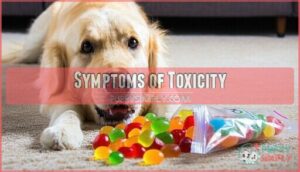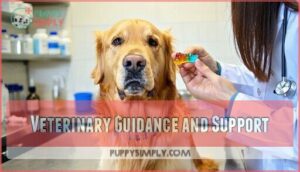This site is supported by our readers. We may earn a commission, at no cost to you, if you purchase through links.

Even sugar-packed gummies aren’t safe, as too much sugar can upset your dog’s stomach and harm their teeth over time. Worse yet, if the gummies are THC-infused, they can be toxic, causing disorientation, lethargy, or worse.
If your dog does sneak a gummy, keep your cool but act fast—contact your vet right away. To be safe, skip the gummies and stick with dog-friendly treats that won’t threaten their health, as prevention is key, and it’s crucial to avoid a severe poisoning.
Table Of Contents
- Key Takeaways
- Dangers of Gummy Bears
- Can Dogs Eat Gummies
- Health Risks for Dogs
- What to Do if Dog Eats Gummies
- Preventing Gummy Bear Consumption
- Safe Treats for Dogs
- Veterinary Guidance and Support
- Frequently Asked Questions (FAQs)
- Can dogs eat edible gummies?
- What happens if a dog eats a gummy?
- Can dogs eat gummy candies?
- Can dogs eat THC gummies?
- Can dogs eat gummy vitamins?
- What if my dog ate gummy bears?
- Can you give human gummies to dogs?
- Are dogs allowed to have gummy candy?
- Can dogs eat 1 gummy bear?
- What happens if my dog eats a sour gummy?
- Conclusion
Key Takeaways
- Gummies aren’t safe for dogs because they often contain xylitol, a toxic sweetener, and other harmful ingredients like sugar or THC.
- Even one gummy can cause health problems like vomiting, lethargy, or severe liver issues, so it’s best to keep them out of reach.
- If your dog eats gummies, act fast—check the ingredients and call your vet for guidance.
- Stick to dog-friendly treats like fruits, vegetables, or vet-approved snacks to avoid any risks.
Dangers of Gummy Bears
Gummy bears might seem harmless, but they can pose serious health risks for your dog.
From toxic ingredients like xylitol to excessive sugar and THC, these sweet treats can quickly turn dangerous.
Xylitol Poisoning
Xylitol in gummies is a hidden threat to dogs, often leading to poisoning. Just a tiny amount can trigger hypoglycemia, liver failure, or worse. Xylitol’s mechanism interferes with insulin release, causing sharp blood sugar drops.
Xylitol in gummies can rapidly trigger hypoglycemia and liver failure in dogs—just a small amount poses a life-threatening risk.
Symptoms like vomiting, weakness, and seizures demand immediate action. Rapid treatment protocols, including IV support, save lives.
Prevention strategies are your best bet—store gummies securely and educate family members on toxicity risks.
- Act fast: Contact your veterinarian immediately.
- Recognize symptoms: Watch for lethargy, seizures, or vomiting.
- Prevent access: Store gummies out of reach.
- Stay informed: Read ingredient labels carefully.
- Seek help: Call poison control if needed.
Sugar and Digestive Issues
Too much sugar in gummies can wreak havoc on your dog’s digestive system.
It’s not just about empty calories—there’s real trouble here:
- Sugar Overload: Triggers digestive upset and dehydration risks.
- Gastroenteritis: Causes stomach discomfort and inflammation.
- Dental Problems: Sugar leads to cavities and decay.
- Obesity Threat: Long-term effects strain overall health.
- Hypoglycemia: Sudden sugar crashes can harm blood sugar balance.
Keep gummies far out of reach!
THC and CBD Toxicity
THC and CBD toxicity can seriously affect dogs, causing tremors, drooling, or unsteadiness due to their heightened receptor sensitivity, which makes THC overdose a significant risk.
While CBD side-effects are milder, lethargy or stomach issues may appear, and breeds vary in their response to cannabis products, so always stay alert.
| Toxicity Type | Symptoms | Duration |
|---|---|---|
| THC Overdose | Tremors, unsteadiness | Up to 24+ hours |
| CBD Side-effects | Lethargy, upset tummy | Short-lived |
| Marijuana Toxicity | Drooling, seizures | Days in severe cases |
The duration of these effects can vary, with THC overdose lasting up to 24+ hours, CBD side-effects being short-lived, and marijuana toxicity potentially lasting days in severe cases.
Can Dogs Eat Gummies
Gummies might seem harmless, but they’re not safe for dogs. Most gummy candies contain ingredients that can harm your pet’s health. With toxic gummy ingredients like xylitol, high sugar, or even THC, the risks far outweigh any treat-like appeal.
Gummies may look innocent, but hidden dangers like xylitol and THC make them a serious risk to your dog’s health.
Dogs have unique sensitivities, and even one gummy could lead to dangerous outcomes. Keep in mind that breed sensitivity, size, and weight all affect how a dog reacts. Sugar-free gummies are especially hazardous, as xylitol causes rapid blood sugar drops or liver damage.
Regular gummies aren’t much better—sugar overload can upset their digestion, cause obesity, or weaken teeth. Many jams also pose a threat, due to high sugar content.
Here’s why gummies for dogs are never worth the risk:
- Xylitol poisoning triggers severe health crises.
- High sugar hurts digestion and long-term health.
- THC impacts them more than humans.
- Dosage concerns amplify dangers.
- Legal implications may arise if THC’s involved.
Skip the gummy candy for dogs. Play it safe, as the potential for severe health crises is too great.
Health Risks for Dogs
Gummies can pose serious health risks to your dog due to harmful ingredients like xylitol, THC, and excessive sugar.
These substances can cause symptoms ranging from vomiting and lethargy to severe liver or kidney damage, requiring immediate attention due to the potential for severe liver or kidney damage.
Toxic Ingredients
Regarding gummy bear toxicity, ingredients can make all the difference for dogs. Some, like xylitol, an artificial sweetener, drop blood sugar dangerously low, threatening life. Others, like Vitamin D, cause kidney issues, while iron risks gastrointestinal harm. Even 5-HTP can lead to disorientation or seizures.
A dog that eats gummies with THC may experience concerning blood pressure changes.
- Xylitol dangers: Severe liver damage.
- Vitamin D risks: Kidney failure.
- Iron overdose: Vomiting and diarrhea.
Always store gummies securely.
Symptoms of Toxicity
When your dog eats gummies, look for toxicity signs like vomiting, diarrhea, or lethargy.
Symptom severity varies but watch closely for unsteadiness, drooling, or behavioral changes, as these distress signs may escalate into life-threatening symptoms.
Rapid onset time means monitoring urination and reactions is key.
Toxic effects, like those from xylitol or THC, demand immediate action—contact your vet to prevent long-term effects or complications.
Liver Injury and Kidney Damage
When toxins build up in your dog’s system, it can lead to serious liver injury or kidney damage.
Dangerous ingredients like xylitol, even in small amounts, trigger hypoglycemia and liver problems. High levels of Vitamin D may cause calcium spikes, risking kidney failure. Iron is another hidden hazard, potentially harming the liver.
Watch for these toxic effects:
- Lethargy, vomiting, or diarrhea.
- Changes in drinking or urination habits.
- Loss of appetite or incoordination.
Protect your pet from long-term effects by seeking veterinary care and exploring treatment strategies promptly.
What to Do if Dog Eats Gummies
If your dog eats gummies, stay calm and act quickly. Identify the type and amount consumed, then contact your veterinarian or a pet poison control center for immediate guidance.
Immediate Actions
If your dog nabs some gummies, act fast.
Identify ingestion by checking ingredients—spotting xylitol calls for immediate medical attention. Clear the area of any remaining pieces, wrappers, or packaging.
Contact your vet or poison control for guidance, providing your dog’s weight, symptoms, and what they ate. Monitor symptoms like lethargy, diarrhea, or unsteadiness closely.
| Action | Why It Matters | What To Do |
|---|---|---|
| Identify Ingestion | Track potential toxins | Check labels for xylitol |
| Contact Vet | Expert guidance | Share details; follow advice |
| Monitor Symptoms | Guarantee safety | Watch for worsening conditions |
Veterinary Care
If your dog eats gummies, getting veterinary care quickly is key.
A veterinarian might use emergency treatments like inducing vomiting or activated charcoal to limit toxin absorption. They may also provide symptom management through supportive care.
Toxic ingredients like xylitol can be life-threatening.
Expect:
- Fluid therapy for flushing toxins.
- Monitoring signs to track progress.
- Detailed veterinary advice to avoid long-term effects.
Don’t wait—early action makes for the best outcome.
Treatment Options
After consulting the veterinarian, treatment options for toxicity focus on rapid care. Acting quickly can make all the difference.
Here’s what to expect:
- Inducing Vomiting: Removes recently ingested toxins if recommended by the veterinarian.
- Activated Charcoal: Minimizes absorption of harmful substances in the stomach.
- IV Fluids: Restores hydration and flushes out toxins from the system.
If your dog has ingested THC, it’s important to seek immediate veterinary attention.
- Symptom Management: Addresses seizures, tremors, or lethargy for comfort and recovery.
- Monitoring Complications: Allows early detection of worsening symptoms.
Quick action guided by veterinary care guarantees your pet’s best chance for recovery.
Preventing Gummy Bear Consumption
Keeping gummy bears away from your dog starts with secure storage and close supervision.
Store them in places your dog can’t reach, and always keep an eye on your pet during snack times.
Secure Storage
Keep gummies out of your dog’s reach with child-proof containers, locked cabinets, or elevated shelves. These storage methods offer reliable access prevention and protect your curious pup.
Opt for airtight containers to hide enticing smells.
Here’s a quick guide:
| Method | Benefit |
|---|---|
| Child-proof containers | Prevent accidental ingestion |
| Locked cabinets | Maximum pet-proof storage |
| Elevated shelves | Limits curious climbing |
| Airtight containers | Reduces scent attraction |
| Safe storage tools | Guaranty overall pet safety |
Supervision and Monitoring
Always practice constant vigilance with your dog’s environment. Their curiosity often leads to sniffing around for off-limits goodies.
Monitor for behavioral changes, like acting distracted or inspecting secure areas, as these could signal potential ingestion risks. Stay attuned to symptoms and their severity—prompt reactions reduce the need for emergency veterinary care.
Pet-proofing creates an added layer of environmental safety. Remember, prevention is key! A safe home and proper monitoring help your dog avoid toxic treats entirely.
Dogs should also avoid treats with artificial colors and flavors. How’s that for peace of mind? Always prioritize your dog’s safety to ensure a healthy environment and a happy life.
Healthy Alternatives
For healthier snack options, try apple slices, carrots, or vet-recommended treats.
These homemade treats and dog-safe recipes provide crunch and nutritional benefits while keeping your pet happy.
Healthy dog treats like dental chews or limited-ingredient snacks support a balanced diet.
For even more variety, consider chewy dog treats as a training reward. Plus, there are safe gummy alternatives you can whip up at home.
Treat portions should always fit your dog’s diet, so check with your vet for dog nutrition advice and dogsafe treats.
Safe Treats for Dogs
You can offer your dog safe, healthy treats that aren’t just delicious but are also good for them.
Options like fruits, vegetables, plain yogurt, and peanut butter provide natural alternatives to gummies without harmful ingredients.
Fruits and Vegetables
Skip gummies and go for fruits and vegetables that are safe for dogs. They’re tasty and pack real nutritional benefits!
Here are five options:
- Apples: Remove seeds, slice small.
- Cucumbers: Hydrating, low-calorie snack.
- Carrots: Crunchy, vitamin-rich.
- Blueberries: Antioxidant powerhouses.
- Bananas: Sweet, but serve small portions.
Avoid toxic veggies like onions or grapes, and always wash produce first.
Yogurt and Peanut Butter
Why not treat your pup to yogurt or peanut butter? Both are delicious and can be healthy dog treats when chosen wisely.
- Pick wisely: Use plain yogurt for probiotics and unsalted peanut butter for protein.
- Avoid these: Products with xylitol, artificial sweeteners, or added sugar.
- Safe serving tip: Offer small amounts as occasional treats.
- Creative idea: Make simple yogurt-peanut butter frozen bites to keep your dog cool and happy.
CBD Pet Products
Pet CBD products are a safe and effective way to support your dog’s health.
Regulated options, like oils or chews, offer CBD benefits such as anxiety relief, joint support, and relaxation.
Check dosage guidelines carefully to avoid side effects.
Unlike cannabis or marijuana edibles, trusted pet CBD products are THC-free and designed with your pet in mind.
Some owners prefer chewy CBD options for their dogs.
Stick to safe brands backed by CBD research for peace of mind and your furry friend’s well-being.
Veterinary Guidance and Support
If your dog eats gummies, reaching out to a veterinarian or pet poison hotline is vital for proper guidance.
Regular check-ups and expert advice guarantee your pet’s health stays on the right track.
Emergency Contact
If your dog eats gummies, act fast—it’s a pet emergency.
Call Poison Control, the ASPCA Hotline, or your local veterinarian for immediate medical attention.
Share emergency details like symptoms and ingestion specifics.
Reporting the incident fully helps guide veterinary care.
Don’t delay; dogs react quickly to toxins.
Consider pet product options for preventative safety.
Keep packaging ready for the vet.
Quick action guarantees the best outcome, making emergency response vital when your furry friend needs help.
Regular Check-Ups
Regular vet check-ups are like a safety net for your dog’s health.
They help with early detection of problems and provide essential preventative care.
During wellness exams, vets monitor for breed predispositions and dog health risks.
A vet can also administer core vaccines yearly to keep your dog healthy.
Focus on these areas:
- Early Detection of hidden illnesses.
- Preventative Care to safeguard health.
- Weight Monitoring for fitness.
- Dental Checks to avoid gum issues.
- Behavioral Insights for comfort.
Nutrition and Diet Advice
A Balanced Canine Diet plays a big role in keeping your dog healthy and happy.
Meeting their Nutritional Needs starts with smart choices like avoiding unsafe foods, including gummy candy, which can harm your dog’s digestion and overall health.
Take time Reading Food Labels to spot toxic ingredients, and lean on reliable dog nutrition advice when deciding what’s best to serve.
Homemade Dog Food is a great option when crafted with safe, whole ingredients.
Alongside this, proper hydration supports healthy digestion and prevents common dog digestive issues.
Here’s a quick breakdown:
| Habit | Why It Matters |
|---|---|
| Reading Food Labels | Avoid toxic ingredients |
| Portion Control | Supports healthy weight |
| Homemade Dog Food | Provides safe, natural nutrition |
| Keeping Dogs Hydrated | Encourages smooth digestion |
Your dog’s health thrives with thoughtful choices, focusing on Homemade Dog Food and Keeping Dogs Hydrated to ensure they receive the best care possible.
Frequently Asked Questions (FAQs)
Can dogs eat edible gummies?
Sweet treats may seem harmless, but edible gummies can seriously harm your dog.
Packed with sugar, artificial flavors, and toxic ingredients like THC or xylitol, gummies aren’t safe.
Keep them out of paw’s reach.
What happens if a dog eats a gummy?
If your dog eats a gummy, they might experience symptoms like lethargy, vomiting, or unsteadiness.
Some gummies contain harmful ingredients like THC or xylitol, which can be toxic.
Call a vet immediately for guidance.
Can dogs eat gummy candies?
Over 50% of pet poison cases involve household items.
Gummy candies aren’t dog-safe—they often contain xylitol, sugar, or THC, which can harm them.
Always prioritize your dog’s health and stick to vet-approved treats.
Can dogs eat THC gummies?
Dogs should never consume THC gummies.
Their sensitivity to THC can cause serious health issues like lethargy, seizures, or unsteadiness.
Always store edibles securely, out of reach, and consult a vet immediately if ingestion occurs.
Can dogs eat gummy vitamins?
You might think gummy vitamins are harmless, but they’re not safe for dogs.
Ingredients like xylitol, iron, or Vitamin D can cause toxicity.
Always keep them out of reach and use vet-approved supplements instead.
What if my dog ate gummy bears?
If your dog ate gummy bears, check for harmful ingredients like xylitol, which is toxic to dogs.
Monitor for symptoms like vomiting or lethargy, and contact your vet.
Keep gummies out of reach next time!
Can you give human gummies to dogs?
Feeding human gummies to dogs is like tossing dice with their health—risky and unwise.
Gummies often contain harmful ingredients like xylitol or THC, which can be toxic.
Stick to pet-safe treats for your furry friend.
Are dogs allowed to have gummy candy?
Gummy candy isn’t safe for dogs.
Many contain toxic ingredients like xylitol, which can lead to serious health problems.
Even sugar-filled gummies can cause stomach issues.
Keep them out of reach to prevent harm.
Can dogs eat 1 gummy bear?
It’s not safe to give a dog even one gummy bear.
Gummies often contain sugar, artificial flavors, or toxic ingredients like xylitol, which can harm dogs.
Stick to dog-friendly treats instead.
What happens if my dog eats a sour gummy?
If curiosity got the better of your dog and it ate a sour gummy, watch for symptoms like vomiting, drooling, and lethargy.
Sour gummies often contain sugar or toxic ingredients—call your vet for advice.
Conclusion
While gummies might seem harmless, they’re far from a safe treat for your dog.
Xylitol’s toxicity, sugar’s harm, and THC’s dangers make gummies risky snacks. Even one gummy can lead to severe health issues, from stomach upset to liver failure.
If your dog sneaks one, don’t panic—reach out to your vet immediately. Prevention’s always better, so stick to dog-safe treats your pup will love.
Remember, regarding the question of “can dogs eat gummies,” the answer is clear—don’t risk it, as it’s a clear threat to your dog’s health.
- https://www.vetcarepethospital.ca/marijuana-toxicity-dogs/
- https://www.riverviewanimalhealthcentre.ca/resources/blog/september-2018/so-your-dog-got-high
- https://www.fda.gov/consumers/consumer-updates/paws-xylitol-its-dangerous-dogs
- https://www.petpoisonhelpline.com/pet-safety-tips/marijuana-toxicity-pets/
- https://www.mayoclinic.org/diseases-conditions/dehydration/symptoms-causes/syc-20354086
















